Faculty News
Faculty Profile | Faculty News | Professor Gustavo Sainz Retires | In Memoriam: Frances Wyers
Faculty Profile
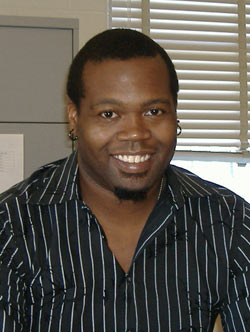
Allen Davis
Professor Allen Davis is our new Director of the Basic Spanish Language Program. After receiving his BA in Spanish with a minor in Sociology and a Certificate in Translation Studies from Indiana University-Purdue University at Indianapolis, Davis went on to earn both his MA and in 2011, his PhD in Hispanic Linguistics at Penn State University. His broad research interests lie in phonetics and phonology; specific topics of interest within this field include second language phonological acquisition, bilingual and bi-dialectal phonology, and the relationship between musical aptitude and phonological acquisition. Sociolinguistic issues and topics about language and society are also of interest, and Afro-Latino language and culture.
During his undergraduate studies, Davis frequently volunteered in the Latino community, working as a translator and interpreter for various hospitals and organizations in his native Indianapolis. Today, he continues to pursue his interest in both the Spanish language and language acquisition as Director of the Basic Language Program, hoping to educate both new language learners and new language instructors. Current projects include collaborating with the Assistant Director of the Basic Language Program on a language pedagogy lecture series that will serve as continuing education for the Spanish program’s new language instructors. He will also be presenting his work on the relationship between pronunciation accuracy and musical aptitude at various conferences in the months to come. In his spare time, he sings baritone in the Indianapolis Symphony Choir, currently in its 75th season.
Faculty News and Awards
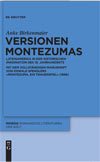
Versionen
Montezumas

Havana Beyond
the Ruins
Anke Birkenmaier published Versionen Montezumas. Lateinamerika in der historischen Imagination des 19. Jahrhunderts. Mit dem vollständigen Manuskript von Oswald Spenglers Montezuma. Ein Trauerspiel (1897) (Berlin, Boston: Walter de Gruyter, 2011). She co-edited with Esther Whitfield the volume Havana Beyond the Ruins. Cultural Mappings after 1989 (Durham: Duke University Press, 2011).
Vania Castro was selected to attend the FACET (Faculty Colloquium for Excellence in Teaching) Associate Faculty and Lecturers' Conference in Indianapolis, IN.
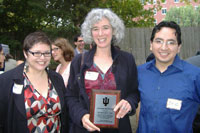
Deborah Cohn
Deborah Cohn received the 2011 Outstanding Mentor Award given by the department's Graduate Student Advisory Council.
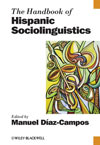
The Handbook of
Hispanic
Sociolinguistics
Manuel Díaz-Campos published The Handbook of Hispanic Sociolinguistics. Malden, MA: Wiley-Blackwell, 2011.
Patrick Dove was co-recipient of grants from the Institute for Advanced Study, College Arts & Humanities Institute and Multidisciplinary Ventures and Seminars for a Spring 2012 conference on “Desencuentros: Sovereignty, Revolution and Neo-anarchism in Latin America.”
Cesár Félix-Brasdefer received overseas conference fund support from the Office of the Vice Provost of International Affairs and a New Frontiers Exploration Travel Fellowship to present a competitive paper at the 4th International Conference on Intercultural Pragmatics, Madrid, Spain, November 2010.
Kim Geeslin delivered the keynote address at the Hispanic Linguistics Symposium, held at the University of Georgia in Athens, GA, entitled "The acquisition of variable structures in second language Spanish: The state of the discipline(s)."
Laura Gurzynski-Weiss received a Scholarship of Teaching and Learning grant from the Office of the Vice Provost for Undergraduate Education for the project "Comparing interaction in traditional and innovative classroom spaces." The project is in collaboration with graduate students Avizia Long and Megan Solon.
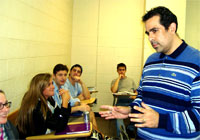
Israel Herrera
Israel Herrera was honored with the IU Alumni Association's Student Choice Award for Outstanding Faculty 2011 and a 2011 Trustee's Teaching Award. He was appointed by Mayor Mark Kruzan to serve on the City of Bloomington Commission on Hispanic and Latino Affairs Board and has been elected Vice-President of the Indiana Chapter of the American Association of Teachers of Spanish and Portuguese. He was also appointed to the Faculty and Staff Policy Issues Committee of the IU Commission on Multicultural Understanding.
Virginia Hojas Carbonell received her full OPI (Oral Proficiency Interview) certification in Spanish from ACTFL.
Edgar Illas received a Summer Travel Research Grant from the College Arts and Humanities Institute for his project "Mapping Catalan Ideologies."
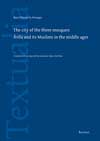
Textualia
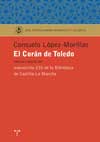
El Corán de Toledo
Consuelo López Morillas published El Corán de Toledo. Edición y estudio del manuscrito T 235 de la Biblioteca de Castilla-La Mancha, Bibliotheca Arabo-Romanica et Islamica, 5 (Gijón: Ediciones Trea, 2011) and The City of the Three Mosques: Ávila and its Muslims in the Middle Ages, a translation of Ana Echevarría Arsuaga's Los musulmanes de Ávila, siglos XI-XVI. Series “Textualia: Jews, Christians, and Muslims in Their Texts” (Wiesbaden: Reichert, 2011).
Alejandro Mejías-López received a conference travel grant from the Center for Latin American and Caribbean Studies to present a paper at the MLA Convention in Los Angeles, CA.
Kathleen Myers received a 2011 New Frontiers in the Arts & Humanities grant for her project In the Shadow of Cortés.
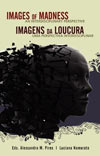
Images of Madness
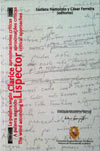
La palabra
según
Clarice Lispector
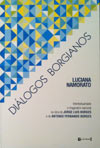
Diálogos borgianos
Luciana Namorato published Diálogos borgianos: Intertextualidade e imaginário nacional na obra de Jorge Luis Borges e de Antonio Fernando Borges (Rio de Janeiro: Editora 7Letras, 2011). She also co-edited two volumes: La palabra según Clarice Lispector: Aproximaciones críticas / A palavra segundo Clarice Lispector: Aproximações críticas / The Word According to Clarice Lispector: Critical Approaches, with César Ferreira (Lima: Universidad Nacional Mayor de San Marcos—Ediciones del Vicerrectorado Académico / Centro de Estudios Literarios Antonio Cornejo Polar, 2011) and Images of Madness: An Interdisciplinary Perspective / Imagens da loucura: Uma perspectiva interdisciplinar with Alessandra M. Pires, (Bolivar, MO: From the Scholars Desk, 2010).
Darlene Sadlier received a performance grant from the College Arts and Humanities Institute in support of the visit of Portuguese filmmaker Pedro Costa and a film festival celebrating his work. She is also editor of Brasiliana in the Lilly Library (Bloomington: The Lilly Library, 2010), an annotated bibliography of selected Brasiliana holdings from the colonial period into the 20th century.
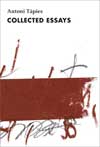
Collected Essays
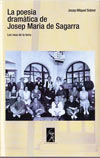
La poesia
dramàtica de Josep
Maria de Sagarra
Josep Sobrer published La poesia dramàtica de Josep Maria de Sagarra; les veus de la terra (Vabrera de Mar, Barcelona: Galerada, 2011) as well as a translation,Collected Essays, volume 2 of the Complete Writings of Antoni Tàpies (Bloomington and Barcelona: Indiana University Press and Fundació Antoni Tàpies, 2011).
Steve Wagschal was selected for the Faculty Exchange Program at the University of Seville, Spain (June 30 – July 30, 2011). He was awarded a research fellowship from the College Arts and Humanities Institute for “Interpretation, Spandrels and Don Quixote” and was selected to participate in the Institute for Advanced Study's Remak New Knowledge Center Seminar on "Interpretation."

Erik Willis
Erik Willis received research support for data collection on the acoustic qualities of Dominican Spanish vowels from the Center for Latin American and Caribbean Studies. He also earned the 2011 Trustee's Teaching Award.
Professor Gustavo Sainz Retires

Gustavo Sainz
Professor Gustavo Sainz retired from Indiana University in May, 2011 after 19 years in our department. One of the most renowned and original voices in 20th-century Mexican fiction, Professor Sainz first came to Bloomington as a visiting professor in fall 1992 after having held appointments at the Universidad Autónoma de México, the University of Wisconsin, the University of New Mexico, Northern Illinois University, and Washington University-St Louis. In 1995, he joined us as a full professor and proceeded to teach a wide variety of undergraduate courses on Latin American literature, Mexican literature, and film.
A founding member of La Onda, the Mexican literary and cultural movement of the 1960s and 70s, Gustavo Sainz published his first novel, Gazapo, in 1965, which earned him immediate international acclaim. Translated into fourteen languages, Gazapo remains a landmark in contemporary Mexican narrative. Since then, he has published over nineteen novels in addition to short stories and children’s books. Among other national and international awards, in 1974, Gustavo Sainz received the prestigious Xavier Villaurrutia Prize for his novel La princesa del Palacio de Hierro (The Princess in the Iron Palace) and in 2003 the Colima Prize for his novel A troche y moche. His narrative work has been the subject of numerous scholarly works, including books, articles, and dissertations in Mexico, the US, and Europe.
After teaching at IU for nineteen years, Professor Sainz plans to keep writing and publishing and has now embarked on a new project: the creation of a cultural center in the city of Saltillo, Coahuila, Mexico, to whose public library system Professor Sainz has donated his truly vast collection of over 75,000 books, films, and artwork.
We wish Professor Gustavo Sainz all the best in this new endeavor and stage of his career.
In Memoriam: Frances Wyers
When she retired from Indiana University in 1999, Frances Wyers moved to Galilea, one of the least touristy parts of the island of Mallorca, Spain, where she had long owned a summer home, Ca Ses Animes, a restored cottage which she loved. Her older son, Daniel, died in 2006. Son David and his wife live in Palma de Mallorca, and she took an apartment in the island’s capital city. On August 20, 2011, she died there. Her ashes were scattered in an orchard of ancient olive trees.
Whenever I hear the evening “Marketplace” program on WFIU radio announce that it will “do the numbers,” meaning give the daily stock report figures, I think of Frances’s frustration at that annoying evisceration of standard English: do the numbers. And I remember her enjoyment, recalling a philosophy reading group in Mallorca, in sharing the fact that Catalan, one of the languages she spoke, renders Nietzsche’s name as ul Neetch. Frances had a great appreciation for language and its nuances. She was an intellectual who read widely in philosophy, literature, and criticism and wrote with remarkable insight and lucidity. In short, a scholar’s scholar and a brilliant teacher of literature. To the joy of graduate students and colleagues, she was a walking bibliography with an enviable recall of titles, authors, and ideas. She was also an accomplished artist who produced fine landscapes and figures in pastel; she had an exhibit in Bloomington at the Waldron Art Center.
Frances Wyers received her PhD in Romance Languages in 1962 from the University of Michigan. She was the first woman appointed assistant professor of Spanish at Michigan and subsequently the first woman full professor of Spanish. Recipient of many honors, she was awarded an NEH Research Fellowship in 1970-71 for her project on Miguel de Unamuno and other writers of Spain's Generation of 1898, which allowed her to return to Madrid to pursue her research. Following a national search, in 1981 she came to Indiana University as the first woman to chair the Department of Spanish and Portuguese. One of her first acts as chair was to bring the faculty teaching load in line with that of other departments in the College of Arts and Sciences, thus enhancing the department’s standing within the College and making us a community of scholars and teachers, rather than being considered language teachers. Following her term as chair, she returned to full-time teaching and research, offering a broad range of courses on literature, culture, and literary theory. In an era of specialization when faculty were expected to center their teaching and publication on one area, Frances worked consistently in the literatures of both Spain and Spanish America and established herself as an authority in both areas. During her years at Indiana University, she made frequent visits to Barcelona, Mallorca, and Paris, thus feeding her interest in contemporary Spanish, Catalan, and French culture.
As a scholar, Frances demonstrated her extraordinary breadth of knowledge in an impressive body of publications. To consult the complete listing, one must search the MLA Bibliography under the names “Frances Weber,” “Frances Wyers Weber,” and “Frances Wyers.” She was an early transatlantic scholar, publishing on both Spanish and Hispanic American authors before it became fashionable to cross continental boundaries. Her work centered on 19th-century and 20th-century Spanish fiction and on contemporary Latin American prose. She wrote her first book, The Literary Perspectivism of Ramón Pérez de Ayala, published by the University of North Carolina, on an early 20th-century Spanish novelist. The leading press for Hispanic Studies at the time, the British Tamesis Press, published her second book, Miguel de Unamuno: The Contrary Self, with its revisionary reading of Unamuno as philosopher and writer; it established her as a major critic of this author. Her many scholarly articles, published in all the major journals in her field, demonstrate the scope of her scholarship and make her one of the most lucid and thoughtful critics of contemporary Spanish and Spanish American fiction. She is one of very few Hispanists to have two articles published in the premier literature journal, PMLA, one on Unamuno’s Niebla and the other on Carpentier’s El acoso. She also placed her work in the top-ranked journals in Hispanism: articles on Unamuno, Borges, Puig, and Ortega in Hispanic Review, on Alas’s La Regenta in the Bulletin of Hispanic Studies, on Valle-Inclán’s Luces de bohemia in MLN, and on Carpentier’s Recurso del método in the Revista Iberoamericana, among others. These are all seminal works of scholarship still consulted by scholars today. Among her most widely-cited publications are two articles on Spain's 19th-century realist masterpiece La Regenta by Leopoldo Alas. Two of her articles have been republished in collections of criticism: one on La Regenta, reprinted in two different anthologies edited in Spain, and ''Manuel Puig at the Movies," which appears in the collection Modern Latin American Literature (Yale University Press). Equally well-known and frequently cited by scholars are her three studies of Alejo Carpentier's novels. Her illuminating article on Mercè Rodoreda’s La plaça del Diamant, one of the early studies of this widely-admired Catalan novel, remains a core study in the extensive bibliography on the novel.
In the Department of Spanish and Portuguese, Frances was especially appreciated for her teaching and her commitment to her students, especially graduate students who wrote dissertations with her or requested that she serve on their MA and PhD examination and dissertation committees. She taught a wide range of courses on Spanish and Spanish-American literature. Her knowledge of and commitment to the Catalan language, literature, and culture further enriched her courses. Her intellectual stimulus, cultural understanding, and wealth of bibliographic knowledge made her an indispensable resource for her colleagues and for generations of students.
With her death the department loses not only a valued colleague, teacher, and friend but also contact with one of the finest minds in the field of Hispanic studies. Those of us who taught or studied with Frances continue to remember her with great appreciation as a model of academic scholarship and a generous colleague and mentor.
Maryellen Bieder